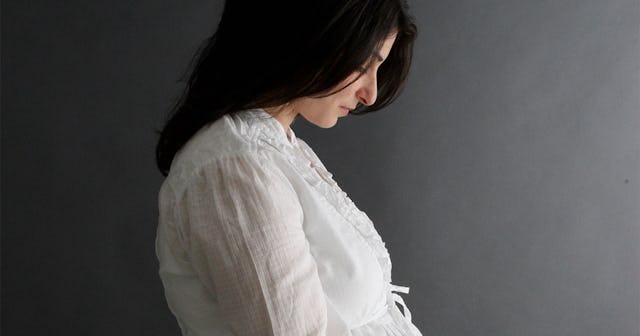Why I Hate The Phrase 'As Long As He's Healthy'

“As long as he’s healthy,” is a phrase I heard often each time I was pregnant. And over the years, it’s a statement I have grown to hate.
Usually, it came from a stranger, or someone I didn’t see very often. Our conversation went something like this:
Them: “Oh! (when they notice my pregnant belly) When are you due?”
Me: “In June.”
Them: “Do you know the gender?”
Me: “A boy.”
Them: “Oh how wonderful! Well, none of that matters, as long as he’s healthy!”
Courtesy of Jaclyn Greenberg
I always wondered why this is such a common thing to say. Is it really necessary to state the obvious? Of course, I wanted my baby to be healthy! No one asks for otherwise. I diligently took prenatal vitamins, attended routine doctor appointments and complied with the rules (no alcohol, no raw foods, etc.). Is this statement a shout out to the universe to deliver a blessing of good health upon my growing fetus? Is it like knocking on wood? That, by ending the conversation with “As long as he’s healthy!” we are somehow reducing the risk of a challenge or loss? Because anything other than a healthy pregnancy is a misfortune, right?
I worried every time I was pregnant. But my anxiety was compounded by the fact that my first pregnancy ended in miscarriage. I didn’t know the term back then, but my oldest child is a rainbow baby (a baby born after a miscarriage or stillbirth). And hearing someone say “As long as he’s healthy” reminded me of my loss. It reminded me of all of the ways I needed to protect my baby, and of all of the ways I had no control.
The pregnancy after my miscarriage went well. But my second baby was born with a ton of issues. I unknowingly caught a virus called Cytomegalovirus, or CMV, when I was pregnant. I had no clue there was a problem until I had a troubling ultrasound when I was already pretty far along in my pregnancy. My son was born physically sick and needed medication and other support. The virus caused brain damage. His future development was unclear when he was discharged from the hospital. The doctors didn’t know if he would be able to walk or talk. And I was devastated.
Unfortunately, no matter how hard we try, many times things don’t go as planned. Sometimes children are born with differences. And what happens then? How do we survive and press on?
I felt an enormous amount of guilt and sadness about the challenges my son would face. I failed to protect him. I was embarrassed to see friends and family. I didn’t know how to explain what happened. And I had no clue how to bridge my previous life with the life I was headed towards.
During those early years, I needed support more than ever. My head was constantly swirling with information and choices about my son’s care. I was scared to run thoughts by friends. I didn’t want to overburden them or put stress on our relationship. I was juggling a lot of intense feelings. But I had a two-year-old and newborn at home. I had to move forward and try to make smart decisions. What choice did I have?
Courtesy of Jaclyn Greenberg
Today, my son is eight years old and an amazing little boy. But, for now, he’s still fully dependent. After years of therapy, I have mostly come to terms with my feelings about his birth and the changes in our lives. I’ve learned how to speak up for his needs as well as my own. I lead by example because I know that people will emulate how I interact with him. And I’ve learned how to take a break when I’m feeling overwhelmed and need time for self-care.
I am also candid about my experience, and it’s opened up my world. I’ve had friends come to me when their child received a diagnosis. One friend spoke in confidence when it was discovered that her daughter has dyslexia. Another recently told me that her son was diagnosed with attention deficit disorder (ADD). And one called me when her son was born with brain damage. He’s since passed away.
I hope they confide in me because I’ve dealt with some difficult situations, and they know I can relate. That I won’t judge them for managing something challenging. And maybe my experience can help support them. But, why does it have to be that way? Why does the journey of something demanding have to feel so taboo?
For the most part, I’ve let go of the guilt I carried. But every once in a while, when I overhear someone flippantly say, “as long as he’s healthy!” those old feelings creep back up. I want to turn around and ask, “What if he’s not? What if life is a journey of experiences, and sometimes, things don’t go as planned? Will that be okay too?”
It has to be. Otherwise how are we capable of moving forward? Very often, pregnancy and motherhood is out of our control. And how we navigate those times is what counts.
This article was originally published on